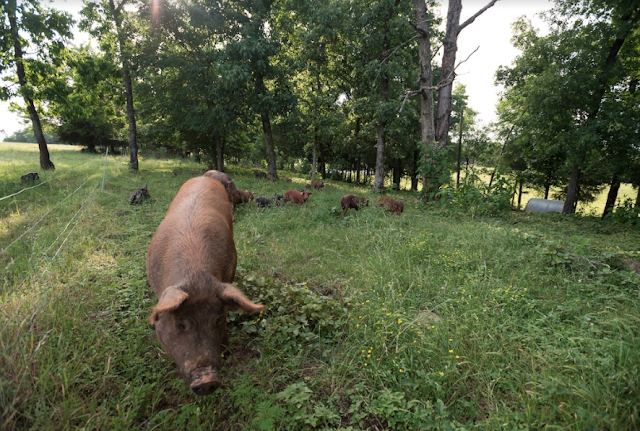Friday, February 26 is
CSA Sign-up Day, a day picked out by Small Farm Central to celebrate and encourage Community Supported Agriculture (CSA). My family has participated in a CSA for several years now and I love it. Admittedly there is a learning curve to eating in season and thinking through the lens of "use what I have." There are many benefits of participating in a CSA. Best of all, it encourages me to get more vegetables on the table. Hands down, local veggies taste better.
If this is your first time with a CSA, ask a friend or neighbor to join you. This way you can take turns picking up the food AND practice using half your share. Some people feel overwhelmed with all the vegetables they receive.
Please note that this CSA is for Little Rock, Conway, Bryant and Ft. Smith!
--Julie
++++++++++++++++++++++++++++
Foodshed Farms Cooperative CSA
--guest post by Liz Wenzel
Foodshed Farms is a farmer-owned cooperative that supports the livelihoods of small-scale Arkansas farmers while increasing access to fresh, local produce. We care about our state and the people in it, so we joined together to grow food that cultivates jobs, community, and wellbeing.
The primary way we do this is through a multi-farm CSA (community-supported agriculture) program, in which shareholders sign up and pay in advance to receive a weekly share of fresh produce throughout the growing season. The CSA model secures a market for our farmers all season long and reduces some of the risk associated with small-scale farming.
Working together as a cooperative has additional benefits for our farmers, allowing them to consolidate marketing, distribution, and technical training so they can turn their energy to growing food that is good for both consumers and the environment.
All of our farmers are Certified Organic or
Certified Naturally Grown, demonstrating their deep commitment to sustainability and long-term health.
Sourcing produce from different regions of Arkansas also helps our shareholders by ensuring a dependable product with lots of variety. We embrace the opportunity to provide our shareholders with the best flavors of Arkansas, from new and exotic vegetables, like kohlrabi and fresh ginger, to tried-and-true favorites such as tomatoes, squash, and kale.
Additionally, as a farmer-owned business, we put our farmers first and support their livelihoods in ways that traditional agriculture typically doesn’t. While USDA research shows that farmers nationwide receive an average of only 15 cents for every food dollar spent, we’re able to give 80 cents of every dollar right back to our farmers.
Through the Foodshed Farms Cooperative CSA we hope to expand the local food market in Arkansas and keep our food dollars in Arkansas’ economy, bettering the lives of small-scale farmers and consumers alike.
2016 Season Details
Full Season Share
16 weeks (May-August)
$440 ($27.50 per week) + tax
Half Season Share
8 weeks (May-June or July-August)
$240 ($30 per week) + tax
Each share contains 6-10 pounds of fresh, seasonal produce with an average of 7-9 items. We recommend one share to supplement the diets of 2-3 vegetable eaters or for an individual who wants to share with friends and family.
Share contents depend on what’s in season and harvested each week, but we will provide a tentative list the week of each pick-up. In addition, you’ll receive a weekly newsletter with recipes, storage tips, and information about the farms your produce is coming from.
Meat Share Add-Ons
Shareholders also have the option to add on a share of pasture-raised, non-GMO meat from
Grass Roots Farmers’ Cooperative. Meat shares will be delivered once a month to your regular CSA pick-up location. Choose between the Whole Farm Share (pasture-raised chicken, grass-fed beef, and forested pork) for $100 or the Cackle Pack (pasture-raised chicken) for $90.
Pick-Up Locations
Deliveries begin May 4-6 and go through August 17-19.
Little Rock
Arkansas Children’s Hospital* (Thursday 4-6 p.m.)
Baptist Health* (Thursday 4-6 p.m.)
Baptist Health* NLR Campus (Friday 4-6 p.m.)
Heifer International* (Thursday 4-6 p.m.)
Unitarian Universalist Church (Friday 4-6 p.m.)
Conway – The Locals Food Hub (Wednesday 4-6 p.m.)
Bryant – Natural Things Food Store (Wednesday 4-6 p.m.)
Fort Smith
Mercy Hospital* (Wednesday 11 a.m.-1 p.m.)
ArcBest Corporation (ArcBest employees only)
Payment Methods
E-check (upfront or in installments)
Credit/Debit card (upfront or in installments)
Check
*Payroll deduction for eligible employees at Arkansas Children’s Hospital, Baptist Health, Heifer International, and Mercy Hospital (Fort Smith)
Sign up for a
Foodshed Farms CSA share at www.foodshedfarms.com


























